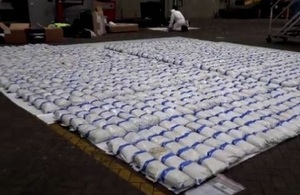Record amount of heroin seized in the UK that was bound for Antwerp
An international investigation has resulted in the largest ever seizure of heroin in the UK, denying vast sums of money to organised crime groups.

Nearly 1.3 tonnes of the class A drug were recovered from a container ship, the MV Gibraltar, after it docked at the port of Felixstowe on 30 August.
National Crime Agency intelligence had ascertained that the heroin would be on the vessel when it docked in the UK en route to Antwerp.
The record haul would be worth around £27 million to organised criminals at wholesale, and in excess of £120 million at street level, where it is typically supplied via county lines dealing.
The ship arrived on 30th August, and was searched by officers from Border Force and the NCA. They found a total of 1,297kg of the substance concealed among a cover load of towels and bathrobes.
After officers removed the drugs, they returned the container to the vessel, which continued on to Antwerp and docked in the Belgian port city on 1 September.
Under surveillance by Dutch and Belgian law enforcement agencies, the container was driven by lorry to a warehouse in Rotterdam, the Netherlands. Upon arrival, officers moved in and arrested four people who were in the process of unloading the consignment.
The 1.3 tonne haul follows the seizure of 398 kilograms of heroin from a vessel at Felixstowe port on 2 August.
UK Ambassor in Belgium, Martin Shearman, said:
This is vivid proof of how much law enforcement between the UK, Belgium and The Netherlands matters to us all.
NCA Deputy Director, Investigations, Matt Horne, said:
This is a record heroin seizure in the UK and one of the largest ever in Europe. It will have denied organised crime tens of millions of pounds in profits, and is the result of a targeted, intelligence-led investigation, carried out by the NCA with international and UK partners.
The size of this and other recent shipments demonstrate the scale of the threat we face. We can be certain that some of these drugs would eventually have been sold in the UK, fuelling high levels of violence and exploitation including what we see in county lines offending nationwide.
The heroin trade also feeds addictions that put users’ lives at risk, while giving rise to crime such as theft which make people feel unsafe in their homes and communities.
NCA officers on the front line lead the fight against the serious and organised criminals who chase profits while dominating and intimidating communities. However, reducing UK demand for illegal commodities such as heroin requires a systematic response across multiple sectors, including health and social care, prisons and education.